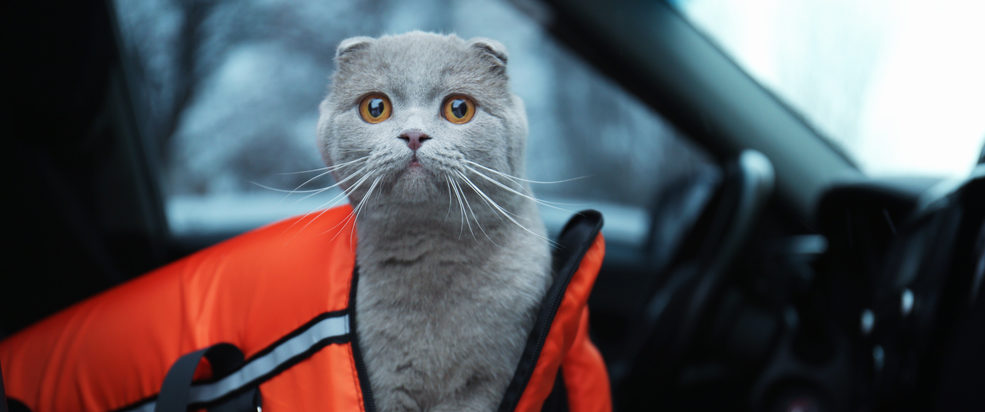It’s not unusual for pets to suffer stress-related diarrhea, especially when it comes to car rides or veterinary visits. Here’s how you can help relieve the causes.
With a dog or cat who tends toward an anxious outlook on life, visiting the veterinarian can be a big stress. One of the most obvious signs of that stress can be diarrhea. Pet diarrhea is stressful for your pet and for you, the family, too! A fecal-filled carrier, loose stool in the crate, and an unhappy pet covered with stool are unpleasant for all involved.
Brain-Gut Link
Why does this happen?
It is important to understand that stress diarrhea is not a conscious reaction by your pet. Dogs and cats have a brain-gut connection with neurons that track information back and forth. Think about Pavlov’s dogs, who connected the sound of a bell with food. They reacted with a digestive system response – drooling in anticipation.
Stressful situations cause a release of norepinephrine – the “fight or flight” hormone. Responses to this hormone are many and varied – heart rate increases, pupils dilate, and intestinal emptying time speeds up. That means diarrhea!
Finding Stressors
You can identify causes of this stress stool. If your dog only poops in the car when going to the veterinary clinic, then you know the visit itself is the stressor. Associate that particular trip with some fun things. Try driving part of the route but stopping along the way to take your dog out of the car and have a short play session in a park. Drive to the veterinary clinic but once your dog is out of the car, don’t go in. Just play with him in the parking lot (safely on leash, please!) After a short play session, load up and go home.
Sometimes it is car rides themselves that cause stress, not the actual veterinary visit. Just as some kids get carsick, so do some pets. Carsick pets may vomit or have diarrhea—or worse, both! Combatting carsickness may require trial and error to find what works.
Keeping the car cool often helps carsick pets. That may mean you need to wear an extra layer in winter instead of cranking up the heat in the car. Good ventilation is important–even more so if your pet has an accident. Try to plan your route to minimize stops, turns, and bumpy pavement.
Possible Solutions
Talk to your veterinarian about administering an anti-nausea medication or anti-anxiety medications in advance of the stressful event. Remember that these need to be given ahead of time to be effective for the trip. Ask your veterinarian about the optimal time for administering them.
Consider spraying a bandana with Adaptil for your dog to wear or spritzing some Feliway on a towel to place in your cat’s carrier. You can do this a couple of hours before the car ride or veterinary visit; the effects typically last for four to five hours.
If your cat mellows out on catnip, that’s worth a try, too. Some cats have the opposite reaction, though; don’t try catnip if he’s the type to start zooming around the house after exposure to it.
Cats are often not happy about being in their carriers whether in a car or not, but you can help them develop fonder feelings for being in one. Leave the carrier open in the house where your cat can check it out at her convenience. Occasionally put a tasty treat, special toy, or some catnip in the carrier to encourage your cat to explore it.
Dietary Aids
It can also help to work directly on the intestinal tract. Consider skipping your pet’s breakfast or possibly even the evening meal the night before. Always check with your veterinarian before skipping any meals as some pets with health problems should not miss a meal. Adding some fiber, such as plain canned pumpkin, might help to firm up any stools your pet might pass.
There may be times when despite all your efforts, your pet has a problem on the trip. Be prepared with some baby wipes, a spray bottle filled with water, and lots of paper towels. Don’t hesitate to ask staff at the veterinary clinic for help. Someone can help hose off your dog, sponge your cat, and clean out a dirty carrier.
Stress diarrhea isn’t fun for anyone. With some planning, though, you and your pet may be able to avoid this unpleasant occurrence.
This article was reviewed/edited by board-certified veterinary behaviorist Dr. Kenneth Martin and/or veterinary technician specialist in behavior Debbie Martin, LVT.








